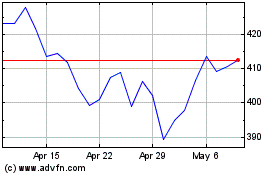By Aaron Tilley
This article is being republished as part of our daily
reproduction of WSJ.com articles that also appeared in the U.S.
print edition of The Wall Street Journal (April 30, 2020).
Microsoft Corp. reported strong growth in quarterly sales and
profit and said the shift of more activities online amid the
coronavirus pandemic is helping propel growth in areas from
cloud-computing to videogames.
The world's most valuable public company showed it was largely
immune to any immediate ill effects from the pandemic even as many
U.S. companies have reported falling earnings and pulled their
full-year outlook because of economic uncertainty from the health
crisis.
Microsoft on Wednesday said sales rose 15% in the first three
months of the year to $35 billion, and it generated a net profit of
$10.75 billion. Both measures topped Wall Street expectations.
"As Covid-19 impacts every aspect of our work and life, we've
seen two years' worth of digital transformation in two months,"
Microsoft Chief Executive Satya Nadella told analysts.
The health crisis has spurred use of Microsoft's workplace
collaboration software suite, called Teams, that includes
videoconferencing and messaging functions. It now has 75 million
daily active users, Mr. Nadella said, more than double the number
in early March.
Cloud-computing, already an earnings driver before the pandemic,
has become more central for many Microsoft customers as they have
moved to support employees working remotely amid a boom in online
activity with people sheltering at home. That helped drive a 59%
jump in sales in the Azure cloud business in the latest period, the
Redmond, Wash., company said.
The broader intelligent cloud segment, which includes Azure,
booked revenue of $12.3 billion, up 21%, while the company's
productivity and business process division, which includes
LinkedIn, sales-management software Dynamics and commercial
subscriptions to the Office 360 product suite, had $11.7 billion in
sales, up 15% from the same quarter a year ago.
Microsoft's stock rose more than 2.56% in after-market
trading.
The results are the sharpest illustration of how some big tech
companies are avoiding many of the business ills afflicting other
industries, and in some cases benefiting from the dramatic shift in
the economy.
Microsoft's personal computer business held up relatively well.
The company in February has warned supply chain disruptions linked
to the Covid-19 outbreak were expected to cause first-quarter sales
in its personal-computing business -- which includes licensing
revenue from PC sales, the Xbox gaming platform and Surface laptops
-- to fall short of the previous revenue forecast of $10.75 billion
to $11.15 billion.
On Wednesday, the company said the PC group generated sales of
$11 billion, as demand to support remote work and teaching offset
some of the supply chain issues. The gaming business benefited from
people staying at home, with Xbox sales increasing 2% in the
quarter, an improvement from the 11% drop in the previous
three-month period. Surface laptop sales rose 1% as demand from
people rushing to buy devices to work remotely outpaced supply
chain issues.
Microsoft also said that the supply chain constraints it had
seen improved later in the quarter. "The supply chain in China
returned to more normal operations at a faster pace than we had
anticipated," Chief Financial Officer Amy Hood said.
Although demand for the cloud has been growing rapidly during
the pandemic, Microsoft has faced some capacity issues dealing with
the increased usage. Microsoft also said it had to slow some of its
cloud infrastructure spending because of the supplier constraints
in China.
"Cloud infrastructure investment will pick up quite a bit," said
Logan Purk, technology analyst for Edward Jones, as Microsoft, like
rival cloud-computing providers such as Amazon.com Inc. and China's
Alibaba Group Holding Ltd., tries to keep pace with demand.
Another challenge for Microsoft is maintaining its
cloud-computing momentum. Although remote working and people stuck
at home are increasing the appetite for tools that run on the
cloud, a broader economic downturn could dent spending plans for
some companies forced to cut costs.
Microsoft said that in the final weeks of the quarter there was
a slowdown in finalizing some licenses, particularly involving
smaller and medium-sized businesses, many of which have been hit
hard by the economic effects of the pandemic.
Microsoft's business social-media network LinkedIn also felt the
effect toward the end of the quarter, with reduced advertising
spending, the company said, though revenue over the full quarter
rose 21% from a year earlier. Advertising spending is expected to
remain muted in the current quarter, Ms. Hood said, and LinkedIn
also could be affected as hiring slows during the economic
downturn.
Microsoft gave a mixed outlook for the quarter ending June 30.
Some of the businesses that have benefited from working from home,
including Surface laptop sales and gaming, should see continued
demand, though growth could ease as stay-at-home guidances are
eased, Ms. Hood said.
Microsoft's sales outlook for the current quarter for the
personal computer segment was slightly ahead of Wall Street's
expectation, though the forecast for the Intelligence cloud and
business process segment was slightly short of analysts'
expectations.
Write to Aaron Tilley at aaron.tilley@wsj.com
(END) Dow Jones Newswires
April 30, 2020 02:47 ET (06:47 GMT)
Copyright (c) 2020 Dow Jones & Company, Inc.
Microsoft (NASDAQ:MSFT)
Historical Stock Chart
From Mar 2024 to Apr 2024

Microsoft (NASDAQ:MSFT)
Historical Stock Chart
From Apr 2023 to Apr 2024
